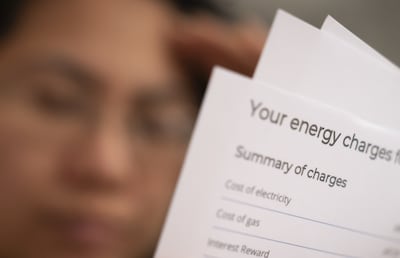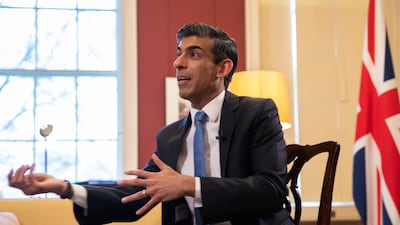Britain's Chancellor Rishi Sunak has announced a package of measures to take the "sting" out of the energy crisis for millions of homes across the UK.
The spiralling cost of living was laid bare on Thursday as the Chancellor was forced to step in to offset a nearly £700 spike in energy bills, while the Bank of England warned inflation would hit its highest point in more than three decades.
Energy bills are set to soar by 54 per cent for 22 million households from the beginning of April after the energy regulator raised the price cap.
The Bank increased its base interest rate from 0.25 per cent to 0.5 per cent, a move it hopes will take some pressure off households.
Acknowledging that rising living costs are the main concern gripping people in Britain, Mr Sunak said the vast majority of homes would be given £350 to help them cope.
Addressing MPs in the House of Commons on Thursday, he laid out his three-point plan which includes a £200 energy bill discount and a £150 council tax rebate.
Mr Sunak said the package would “take the sting out of a significant price shock for millions of families by making sure the increase in prices is smaller initially and spread over a longer period”.

He said without government help, the average household would have to fork out an extra £693 due to Ofgem’s change in the energy price cap.
Households will receive an upfront discount on their energy bills worth £200, with firms applying the discount on bills from October. The government will meet the cost initially and people will pay the discount back in £40 instalments over the next five years.
He said the strategy was the “right way to support people while staying on track with our plan to repair public finances”.
In April, households in the council tax bands A to D will also be offered a £150 rebate funded by government grants under measures for poorer households. This discount will not need to be repaid and will mean that council tax is temporarily slashed in the lowest property bands.
Constituencies in former Labour “Red Wall” regions won by Conservatives in the 2019 general election stand to benefit from the rebates.
Under the third part of Mr Sunak’s plan, local authorities will be given “a discretionary fund of nearly £150 million”. The pot will be used to help lower-income households who live in higher council tax properties as well as households in council tax bands A to D who are exempt from council tax.
Hours before unveiling the sweeping support package, Mr Sunak had been urged to “grasp the nettle” and give households the help they need to cope with rising energy costs.
Prime Minister Boris Johnson was facing demands to ease the cost of living, with his leadership under threat over Downing Street parties.
Ofgem, Britain’s energy regulator, earlier on Thursday announced a more than 50 per cent rise in the energy price cap amid soaring wholesale gas prices.
It said the average fuel bill will be capped at £1,971, a change which is likely to push millions of households into financial stress and possibly fuel poverty.
The rise will come into force from April 1, when the price cap on energy bills is updated for the next six months.

The regulator’s announcement had been scheduled for Monday but officials, without stating why, decided to move it to 11am on Thursday.
Earlier, the Confederation of British Industry, which represents 190,000 businesses, said the Treasury support package was good news but questioned whether loans for energy companies were the right tool.
CBI director general Tony Danker said people were concerned that the rise in energy bills was “not just going to be a once-off” and it would take more than temporary measures to alleviate the burden on households.
“We are probably looking at three years’ worth of very high energy bills and while our economy is growing at the moment, coming back from the crisis, the economy is set to really fall in terms of growth over the next two or three years,” he told Sky News.
He said he hoped Mr Sunak would “grasp the nettle” but that quick-fix solutions would not go far enough to address the crisis.
“My question is whether the economy is going to grow fast enough after this year for everybody to have the wage growth they need to cope with higher bills,” he said.
Also on Thursday, the Bank of England raised interest rates from 0.25 per cent to 0.5 per cent, as it confronted surging inflation.
The British pound rocketed on the back of the BoE’s decision announced on Thursday afternoon.
Inflation is set to hit an eye-watering 7.25 per cent in April, BoE forecasts released on Thursday said.
That scenario would mean that disposable incomes would fall by around 2 per cent, the BoE estimates, the worst impact since records began in 1990.
Naseem Aslam, chief market analyst at Ava Trade, said traders know the Bank is “in no mood to leave things as they are”.
“The BoE is simply not messing around and it has shown today that it wants to bring inflation under control. Two back-to-back interest rate hikes provide a clear guidance to traders that sterling is the currency which they want to back as they see at least two more interest rates hikes coming this year.”
Before the BoE announcement, international brokers ADSS said the outcome would “be key as market watchers eagerly await hints of the future path for UK rates”.
An ADSS representative said many sceptics believe a rate increase “will do little to stem the rise in global energy prices or everyday goods and services”.
“That said, a hawkish outlook ... will go some way to persuading the market that the Bank will do whatever is in its power to stave off inflationary expectations and avoid a catastrophic wage-price spiral,” the representative said.
Before Mr Sunak's announcement, The Times reported that he would commit to giving households in council tax bands A to C rebates.
“We recognise people are facing pressures with the cost of living, which is why we are providing support worth around £12 billion this financial year and next,” a government spokeswoman said.
Government minister James Cleverly had said the Johnson administration was “acutely aware of how difficult this will be for some families and we’re putting things in place to help mitigate that”.
Asked whether the measures would be enough to ensure households survive the crisis, Mr Cleverly, the minister for the Middle East and North Africa, said: “For some people, they’re always still going to struggle.”
He emphasised that ministers hoped that the “combination of general financial support, keeping people in work, making sure that work pays, supporting the people on lowest incomes, and very targeted measures specifically about energy costs” would be enough to support “the majority of people concerned about fuel bills”.
But he said he had never been in poverty and therefore could not to fully comprehend the difficult decision faced my many people – choosing between eating or heating.
“I’ve never been in really acute poverty and I’m not going to pretend I have,” he said.
Oil and gas company Shell, meanwhile, has increased its profit by almost 14 times amid soaring energy prices.
The company’s upstream unit collected $8.88 for every thousand cubic feet of gas it sold to customers in the last three months of 2021.
Six months earlier, gas had been selling for $4.31, less than half of its most recent level.
“We delivered a very strong financial performance in 2021, and our financial strength and discipline underpin the transformation of our company,” chief executive Ben van Beurden said.
That transformation has included a move of Shell’s headquarters to the UK, a simplification of the company’s previously confusing share structure, and the dropping of the “Royal Dutch” part of its name. Formerly known as Royal Dutch Shell, the company is now Shell plc.
These bumper profits have given Mr van Beurden the chance to treat his shareholders. Combined with $5.5bn (£4.1bn) from the sale of a US oilfield, he plans to return $8.5bn to investors by buying back their shares.


